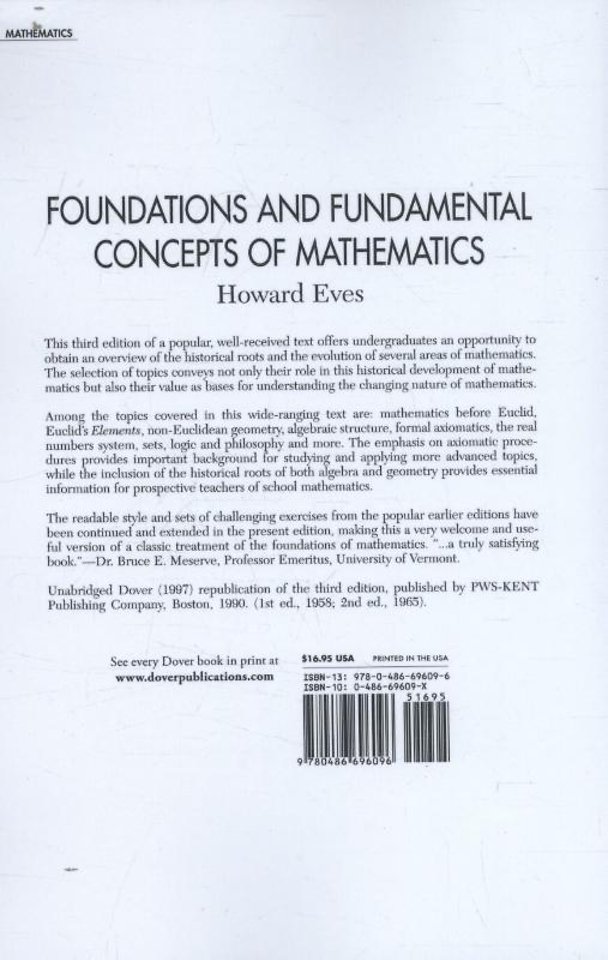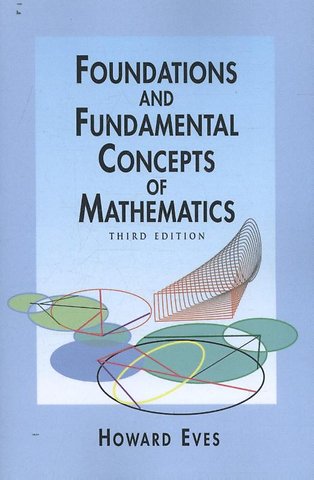Foundations and Fundamental Concepts of Mathematics
Samenvatting
This third edition of a popular, well-received text offers undergraduates an opportunity to obtain an overview of the historical roots and the evolution of several areas of mathematics. The selection of topics conveys not only their role in this historical development of mathematics but also their value as bases for understanding the changing nature of mathematics.
Specificaties
Inhoudsopgave
1(25)
1.1 The Empirical Nature of pre-Hellenic Mathematics
1(4)
1.2 Induction Versus Deduction
5(4)
1.3 Early Greek Mathematics and the Introduction of Deductive Procedures
9(4)
1.4 Material Axiomatics
13(2)
1.5 The Origin of the Axiomatic Method
15(2)
Problems
17(8)
2 Euclid's Elements
26(25)
2.1 The Importance and Formal Nature of Euclid's Elements
26(3)
2.2 Aristotle and Proclus on the Axiomatic Method
29(3)
2.3 Euclid's Definitions, Axioms, and Postulates
32(5)
2.4 Some Logical Shortcomings of Euclid's Elements
37(4)
2.5 The End of the Greek Period and the Transition to Modern Times
41(4)
Problems
45(6)
3 Non-Euclidean Geometry
51(28)
3.1 Euclid's Fifth Postulate
51(3)
3.2 Saccheri and the Reductio ad Absurdum Method
54(4)
3.3 The Work of Lambert and Legendre
58(2)
3.4 The Discovery of Non-Euclidean Geometry
60(5)
3.5 The Consistency and the Significance of Non-Euclidean Geometry
65(5)
Problems
70(9)
4 Hilbert's Grundlagen
79(34)
4.1 The Work of Pasch, Peano, and Pieri
79(3)
4.2 Hilbert's Grundlagen der Geometrie
82(6)
4.3 Poincare's Model and the Consistency of Lobachevskian Geometry
88(4)
4.4 Analytic Geometry
92(6)
4.5 Projective Geometry and the Principle of Duality
98(6)
Problems
104(9)
5 Algebraic Structure
113(34)
5.1 Emergence of Algebraic Structure
113(5)
5.2 The Liberation of Algebra
118(6)
5.3 Groups
124(4)
5.4 The Significance of Groups in Algebra and Geometry
128(4)
5.5 Relations
132(4)
Problems
136(11)
6 Formal Axiomatics
147(26)
6.1 Statement of the Modern Axiomatic Method
147(3)
6.2 A Simple Example of a Branch of Pure Mathematics
150(4)
6.3 Properties of Postulate Sets--Equivalence and Consistency
154(4)
6.4 Properties of Postulate Sets--Independence, Completeness, and Categoricalness
158(4)
6.5 Miscellaneous Comments
162(4)
Problems
166(7)
7 The Real Number System
173(39)
7.1 Significance of the Real Number System for the Foundations of Analysis
173(6)
7.2 The Postulational Approach to the Real Number System
179(4)
7.3 The Natural Numbers and the Principle of Mathematical Induction
183(8)
7.4 The Integers and the Rational Numbers
191(5)
7.5 The Real Numbers and the Complex Numbers
196(6)
Problems
202(10)
8 Sets
212(31)
8.1 Sets and Their Basic Relations and Operations
212(4)
8.2 Boolean Algebra
216(5)
8.3 Sets and the Foundations of Mathematics
221(3)
8.4 Infinite Sets and Transfinite Numbers
224(5)
8.5 Sets and the Fundamental Concepts of Mathematics
229(7)
Problems
236(7)
9 Logic and Philosophy
243(32)
9.1 Symbolic Logic
243(7)
9.2 The Calculus of Propositions
250(7)
9.3 Other Logics
257(5)
9.4 Crises in the Foundations of Mathematics
262(4)
9.5 Philosophies of Mathematics
266(5)
Problems
271(4)
Appendix
275(28)
A.1 The First Twenty-Eight Propositions of Euclid
275(1)
A.2 Euclidean Constructions
276(8)
A.3 Removal of Some Redundancies
284(5)
A.4 Membership Tables
289(1)
A.5 A Constructive Proof of the Existence of Transcendental Numbers
290(2)
A.6 The Eudoxian Resolution of the First Crisis in the Foundations of Mathematics
292(2)
A.7 Nonstandard Analysis
294(2)
A.8 The Axiom of Choice
296(3)
A.9 A Note on Godel's Incompleteness Theorem
299(4)
Bibliography
303(13)
Solution Suggestions for Selected Problems
316(13)
Index
329









